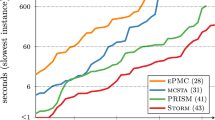Abstract
The factorisation problem is to construct the specification of a submoduleX when the specifications of the system and all submodules butX are given. It is usually described by the equation\(P|X\mathop = \limits^e Q\) where P and X are submodules of system Q, ¦ is a composition operator, and\(\mathop = \limits^e \) is the equivalence criterion. In this paper we use a finite state machine (FSM) model consistent with CCS and study two factorisation problems:P |||P ∼Q andP |||P ≈Q, where ||| is a derived CCS composition operator, ∼ and ≈ represent strong and observational equivalences. Algorithms are presented and proved correct to find the most general specification of submoduleX forP |||P ∼Q withQ τ-deterministic and forP |||P ≈Q withQ deterministic. Conditions on the submachines of the most general solutions that remain solutions toP |||P ∼Q(P |||P ≈Q) are given. This paper extends and is based on the work of M. W. Shields.
Similar content being viewed by others
References
Afrati, F., Papadimitriou, C. H. and Papageorgiou, G.: The Synthesis of Communication Protocols.Algorithmica,3, 451–472 (1988).
Bochmann, G. and Gotzhein, R.: Deriving Protocol Specifications from Service Specifications. InProc. ACM SIGCOM Symp. pp. 148–156 (1986).
Kanellakis, P. C. and Smolka, S. A.: CCS Expressions, Finite State Processes, and Three Problems of Equivalence. InSecond Annual ACM Symp. on Principles of Distributed Computing, pp. 228–240, 1983.
Larsen, K. G.: A Context Dependent Equivalence between Processes.Theoretical Computer Science,49, 185–215 (1987).
Larsen, K. G. and Liu, X.: Equation Solving using Modal Transition Systems. InFifth Annual IEEE Symp. on Logic in Computer Science, pp. 108–117, June 1990.
Merlin, P. and Bochmann, G.: On the Construction of Submodule Specifications and Communication Protocols.ACM Transactions on Programming Languages and Systems,5(1), 1–25 (1983).
Milner, R.: Calculus for Communication Systems.LNCS 92, Springer-Verlag, 1980.
Milner, R.:Operational and Algebraic Semantics of Concurrent Processes. Technical Report ECS-LFCS-88-46, Laboratory for Foundations of Computer Science, University of Edinburgh, February 1988.
Manna, Z. and Wolper, P.: Synthesis of Communicating Processes from Temporal Logic Specifications.ACM Transactions on Programming Languages and Systems,6(1), 68–93 (1984).
Nagle, H. T., Jr, Carroll, B. D. and Irwin, J. D.:An Introduction to Computer Logic, Prentice-Hall, 1975.
Park, D.: Concurrency and Automata on Infinite Sequences. InLNCS 104, Springer-Verlag, 1981.
Parrow, J.: Submodule Construction as Equation Solving in CCS.Theoretical Computer Science,68, 175–202 (1989).
Qin, H. and Lewis, P. M.: Factorisation of Finite State Machines under Observational Equivalence. In:CONCUR'90 Theories of Concurrency: Unification and Extension, J. C. M. Baeten and J. W. Klop (eds), pp. 427–441, LNCS 458, Springer-Verlag, 1990.
Ranatunga, L. P.: Process Synthesis by Solving an Equation in CCS (submitted for publication).
Shields, M. W.: Implicit System Specification and the Interface Equation.The Computer Journal,32(5), 399–412 (1989).
Sidhu, D. P. and Aristizabal, J.: Constructing Submodule Specifications and Network Protocols.IEEE Transactions on Software Engineering,14(11), 1565–1577 (1988).
Author information
Authors and Affiliations
Rights and permissions
About this article
Cite this article
Qin, H., Lewis, P. Factorisation of finite state machines under strong and observational equivalences. Formal Aspects of Computing 3, 284–307 (1991). https://doi.org/10.1007/BF01245634
Received:
Accepted:
Issue Date:
DOI: https://doi.org/10.1007/BF01245634




